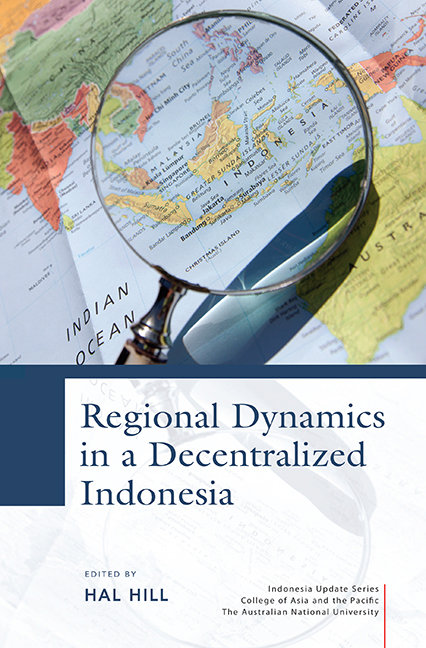Book contents
- Frontmatter
- Dedication
- Contents
- Tables
- Figures
- Contributors
- Acknowledgments
- Glossary
- Map of Indonesia
- 1 An introduction to the issues
- PART 1 HISTORICAL, ECONOMIC, POLITICAL AND SOCIAL PATTERNS
- PART 2 DECENTRALIZATION AND GOVERNANCE
- PART 3 LOCAL-LEVEL PERSPECTIVES
- PART 4 MIGRATION, CITIES AND CONNECTIVITY
- PART 5 CHALLENGES FOR INDONESIA'S PERIPHERY
- 17 The political impact of carving up Papua
- 18 Development in Papua after special autonomy
- 19 Special autonomy, predatory peace and the resolution of the Aceh conflict
- 20 Aceh's economy: prospects for revival after disaster and war
- Author index
- Subject index
- INDONESIA UPDATE SERIES
20 - Aceh's economy: prospects for revival after disaster and war
from PART 5 - CHALLENGES FOR INDONESIA'S PERIPHERY
Published online by Cambridge University Press: 21 October 2015
- Frontmatter
- Dedication
- Contents
- Tables
- Figures
- Contributors
- Acknowledgments
- Glossary
- Map of Indonesia
- 1 An introduction to the issues
- PART 1 HISTORICAL, ECONOMIC, POLITICAL AND SOCIAL PATTERNS
- PART 2 DECENTRALIZATION AND GOVERNANCE
- PART 3 LOCAL-LEVEL PERSPECTIVES
- PART 4 MIGRATION, CITIES AND CONNECTIVITY
- PART 5 CHALLENGES FOR INDONESIA'S PERIPHERY
- 17 The political impact of carving up Papua
- 18 Development in Papua after special autonomy
- 19 Special autonomy, predatory peace and the resolution of the Aceh conflict
- 20 Aceh's economy: prospects for revival after disaster and war
- Author index
- Subject index
- INDONESIA UPDATE SERIES
Summary
INTRODUCTION
Aceh has a troubled history (Box 20.1). During much of the last century, and notably during the three decades to 2005, local conditions across much of the province were hardly conducive to sustained economic growth and development. Although the development process proceeded apace across most of the rest of Indonesia, throughout much of this period broadly based development in Aceh was slow. Today, widespread poverty is still a major problem in many parts of Aceh and the challenges to be faced of promoting growth remain daunting.
In order to consider options for a development strategy during the period ahead, this chapter will first survey trends in Aceh during the past decade (section 20.2). It will then outline the key development challenges facing Aceh today, focusing first on the impact of the aid program and the 2005 Helsinki peace agreement, and then on the policy issues that need to be considered to promote development (sections 20.3–20.7). Finally, it will set out some of the main points of a development strategy for Aceh (section 20.8).
DEVELOPMENTS SINCE 2000
The past decade has been a tumultuous period for Aceh. In order to consider both the opportunities and the challenges that Aceh is facing today, it is necessary to consider the difficult situation in the province in the period after the turn of the century, and then the recent history of transformation since 2005.
In the first few years of the post-Suharto period, during the transition to the reformasi (reform) era, there was much political change across Indonesia and considerable political upheaval in Jakarta as several presidents came and went in quick succession. There was turmoil in Aceh too, but of a different kind. In the early 1990s the central government had initiated military operations against the separatist Free Aceh Movement (Gerakan Aceh Merdeka, GAM) and around 12,000 troops had been deployed to the province. Clashes between the Indonesian military and GAM were common, with frequent allegations of human rights breaches on both sides. Orderly governance in the province was barely possible. In many areas local development was badly held back.
- Type
- Chapter
- Information
- Regional Dynamics in a Decentralized Indonesia , pp. 482 - 508Publisher: ISEAS–Yusof Ishak InstitutePrint publication year: 2014

